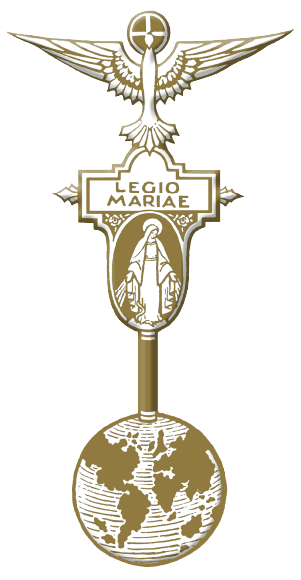Frank Duff and the Legionary Service
There are many passages in the Handbook that have the stamp of autobiography on them. They are rooted in the personal experience and deepest convictions of our Founder Frank Duff. When you read them you cannot help saying to yourself - this is the real Frank Duff, this is the basic character of his inner life that so many knew him could not put their finger on because it was so hidden beneath the external ordinariness of his ready laughter, his great sense of humour and fun, his extraordinary intelligence and organising ability, his great personal interest and attentiveness to people and his innate courtesy. Many pointed to his wise discernment in difficult situations and his many notable achievements. The Handbook points to a much deeper level in the understanding of the sanctity and inner life of Frank Duff. Today let us consider the chapter on Legionary service as an example of the wonderful insight the Handbook gives us into the heart and soul of our Founder.
Frank writes: ‘Contemplating the Crucified Lord, who devoted to him his last sigh and the last drop of his Blood, the legionary service must strive to reflect such utter giving of self.’ Here we have one of the most compelling motives for the apostolic service of our Founder and one that he puts to every legionary. The motive of thanksgiving. There is nothing that God has not given us because He has given us Himself down to his last breath and drop of blood. So in thanksgiving we must give ourselves totally to Our Lord and his service. Thanksgiving was a major dimension of the inner life of Frank Duff.
Again, Frank Duff was inspired and consoled by the fact that so many legionaries were willing to be martyred for their faith and the work of evangelisation. However, he knew that generally speaking, most legionaries would be called to heroic virtue without actual martyrdom. Such was his own life and when he writes the following I feel certain that he was recounting his own life experience: ‘Sour looks, the sting of insult and rebuff, ridicule and adverse criticism, weariness of body and spirit, pangs from failure and from base ingratitude, the bitter cold and the blinding rain, dirt and vermin and evil smells, dark passages and sordid surroundings, the laying aside of pleasures, the taking on of the anxieties which come in plenty with the work, the anguish which the contemplation of irreligion and depravity brings to the sensitive soul, sorrow from sorrows wholeheartedly shared there is little glamour about these things, but if sweetly borne, counted even a joy, and persevered in unto the end, they will come, in the weighing up, very near to that love, greater than which no man has, that he lay down his life for his friend.’ “What shall I return to the Lord for all his bounty to me?” (Ps 116: 12) This passage seems to me to be a summing up of his autobiographical writing in Miracles on Tap. It describes the authentic Frank Duff.
It is certain that Frank Duff never asked legionaries to do things he was not prepared to do himself so when he writes the following he is revealing the secret of his own life. And many intimate witnesses to his life have given testimony to the truth of this passage in the life of Frank Duff and it has become perhaps the most fundamental principle in the Legion method of evangelisation. ‘The secret of all success with others lie in the establishment of personal contact, the contact of love and sympathy. This love must be more than an appearance. It must be able to stand up to the tests that real friendships can bear. This will frequently involve little mortifications.’
Many of the passages we have been quoting have been putting forward ideals for legionaries to live by. But I believe he is the first and founding legionary and therefore they constitute his own ideals and ones that he heroically lived. To know the Handbook is to truly know the man who wrote it and his charism. These next two brief passages I will quote are particularly revealing of the heroic holiness of the life of Frank Duff. I feel certain on the basis of every biography written on him by people who knew him intimately that he embodied in his life the ideals that he put before legionaries.
‘At the bottom of all really fruitful work must be the readiness to give oneself entirely. Without this readiness, one’s service has no substance. The legionary who somewhere sets up the barrier: “thus far and no farther is self sacrifice to go”, will accomplish only the trivial, though great exertions may be made. On the other hand, if that readiness exists, even though it may never, or but in small measure be called upon, it will be fruitful of immense things.’
‘Thus the call of the Legion is for a service without limit or reservations. This is not entirely a counsel of perfection, but of necessity as well, for if excellence is not aimed at, a persevering membership will not be achieved. A lifelong perseverance in the work of the apostolate is in itself heroic and will only be found as the culmination of a continuous series of heroic acts, as indeed it is their reward.’ In these quotations we are not just reading inspiring passages from the Handbook but we are entering into the heart and inner life of our Founder.

